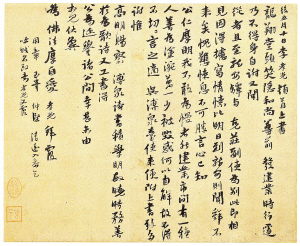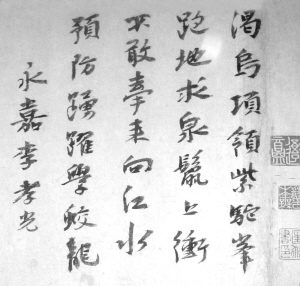Li Xiaoguang (1285~1350) was a lyricist of the Yuan Dynasty. His courtesy name was Jihe and his nickname was Wufeng. He was a native of Yueqing, Wenzhou (now part of Zhejiang). He was erudite in his youth and became famous for his articles. His composition is based on the ancients and does not follow the fashion. In his early years, he lived in seclusion at Baiyunshe at the foot of Wufeng Mountain in Yandang. Because of his profound knowledge and outstanding poetry, scholars from all over the world came to study from far away, and his reputation became increasingly wider. In the fourth year of Zhizheng (1344), he was called to be Secretary Supervisor Zuolang. In the seventh year of Zhizheng (1344), he was promoted to Secretary Supervisor Cheng. In the tenth year of Zhizheng (1350), he resigned and returned south. He died of illness in Tongzhou (Dali, Shaanxi) on the way at the age of 66.
"History of the Yuan Dynasty" is included in the "Biography of Confucianism", saying: "Xiaoguang is famous for his articles." The circulated works are mainly poems. He liked to explore the secluded places in his life, climb to the rooftop, explore the Yu Cave, cross the Qiantang, and visit the Three Wu Dynasties. Traveled all over Kuanglu and the Five Mountains. He wrote a large number of landscape poems, all of which were included in the "Five Peaks Collection", totaling more than 670 poems. Together with Yang Weizhen, he was also known as "Yang Li" in the poetry world at that time.

Page (part) of Li Xiaoguang's "Fa Jian Ye Tie", paper, 31.2cm in length and 38cm in width. , running script. Collection of the Palace Museum, Beijing
This post has no title or postscript. The first signature: "Li Xiaoguang's first letter." There are two seals for appraising the collection: "Huaiting Qingwan" and "Dongping".
This is a letter from Li Xiaoguang to Daxin (Monk Xiaoyin), the abbot of Longxiang Jiqing Temple.
The post said: "When you make a fortune, you will be in a hurry, but you can't help yourself." It also says: "The head of Longxiang Hall" and so on. This was the time when Daxin presided over Longxiang Jiqing Temple. It is also said before: "The tenth day of the last May". According to research, it should be the fifth month of Jiyou in the first year of the Yuan Dynasty (1341). Therefore, it is known that this post was written by Li Xiaoguang when he was 45 years old. His calligraphy is like that of Su Shi, with plump strokes, smooth brushwork, natural connection, square and flat structure, and sometimes side attacks, which shows a very high artistic level.
Explanation:
On the 10th day of the fifth month of the following month, Li Xiaoguang wrote a letter to the head of the Longxiang Hall. I also heard that the follower went to Long'an Station and said goodbye to the deputy envoy of Kezhuang. They met each other immediately, so they could write down their feelings. If I arrive at Long'an tomorrow, I won't be able to come after hearing my words. I'm so ashamed and terrified that I can't put it into words. I know in my heart that I am fair and kind, and I know that I dare not act arrogantly. However, in Jianye City, there is a kind of person who is good at Tu Chuan. If he is deceived, he will not be able to explain himself, so he has to speak out. When Wu Pu Quantai's envoy came, he attached a letter to express his gratitude, but Gao Ming would like to give it some inspection. Pu Quan studied and accumulated knowledge. He was well aware of current affairs. He was good at writing songs and poems, and he was also good at calligraphy. He was very lucky to be honored by the public. Unexpectedly, they met each other, and Fu Ji paid homage to him because of his deep love for Buddhism and his filial piety. Yongzhang, Yufeng, Zhongjian, and Qingyuan entered the ginseng, begging for their humble names to pay tribute, and Xiaoguang returned.

Li Xiaoguang's postscript of Zhao Mengfu's "Drinking Horses", collected by Liaoning Provincial Museum








